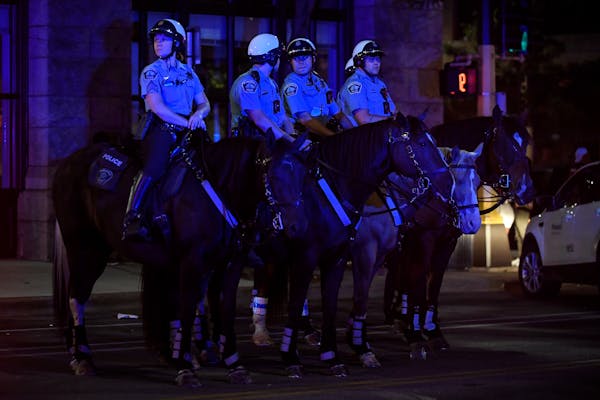The Minneapolis Charter Commission narrowly voted Wednesday to keep one police proposal off the November ballot — dimming the prospects for voters to weigh in this year on how to remake policing following George Floyd's death.
The commission voted 8-6 to block a proposal that would ask voters to remove the requirement to maintain a police force at a level based on the city's population. That was widely viewed as the simpler of two police proposals up for consideration this year.
The debate about how to remake policing — and how quickly — has divided the city. As they debated for nearly an hour Wednesday evening, it was clear the court-appointed commissioners are just as torn as the community they serve.
Some view the commission as a gatekeeper, tasked with deeply researching proposals and ensuring there wouldn't be unintended consequences before voters weigh in. Others feel the commission's role is solely to determine whether the questions are appropriate for voters — and then to trust residents to make the best decisions for themselves.
"At some point, we need to have a discussion about what our job is," said Charter Commissioner Jan Sandberg, who voted to place the measure on the ballot this year, "because some of the things I've heard in the last hour or so about what our job is with respect to this or any ballot initiative, I do not agree with. And I think we need … to come up with some kind of consensus on that."
The commission will convene again next week to consider a more far-reaching proposal to reshape policing brought forward by the City Council.
Conversations about how to change the Police Department have zeroed in on the city's charter, which serves as its constitution, and particularly on the clause that requires the city to fund a police force of a certain size.
Since Floyd's death, activists and some officials have called for the city to end its Police Department. Others, including many alarmed by a wave of shootings and other violent crime, have called on the city to pause and first develop a more detailed plan for how to proceed.
Some commissioners who voted against placing the measure on the ballot this year argued that they felt there hadn't been enough time for public engagement while both proposals moved through an expedited process. They favored more research to ensure that people could weigh any unintended consequences before casting their votes.
Commissioner Dan Cohen, a former City Council member and one of the commission's most vocal supporters of police, said he feared that if either measure passed, "crime would soar, property values on our homes would fall" and residents "would flee the city."
"I believe that if one of these measures were to pass the voters of Minneapolis, the result would be a giant self-inflicted wound," he said.
Multiple commissioners who voted to block the measure said they felt the panel needed to consider the political climate. While a vote on this charter amendment wouldn't have directly reduced the size of the police force, it would have handed that power to City Council members who have pledged to do so.
"We wouldn't put it in a charter if we were drafting the charter anew," Commission Chairman Barry Clegg said of the minimum staffing requirement. "But it's there now and the fact is that it's become code for 'defund the police.' So I think it takes on bigger meaning than just some quirky add-on that was done 60 years ago."
Commissioners who voted to put the proposal on the November ballot argued that they must divorce their own feelings about defunding the police from the issue of whether residents should get to vote on the matter.
"I don't know that I would vote for it" if it appeared on the ballot, said Commissioner Christopher Smith. "But I don't think it's the role of this commission to stop this from going before a vote."
The lean of the commission became clear Tuesday when a Charter Commission work group voted 4-2 to recommend keeping the item off the ballot this year.
On Wednesday, eight commissioners voted to block the proposal from the ballot: Cohen, Jill Garcia, Peter Ginder, Andrew Kozak, Jana Metge, Matt Perry, Lyall Schwarzkopf and Clegg.
Voting to put the item on the ballot were commissioners Greg Abbott, Al Giraud-Isaacson, Toni Newborn, Andrea Rubenstein, Sandberg and Smith. Commissioner Barbara Lickness was absent during the vote.
The more closely watched vote will come next week, when the commission decides on an amendment written by five City Council members.
That proposal would eliminate the requirement to keep a police department. In its place, the city would have a broader community safety department that might or might not include officers.
The commission could offer a recommendation on that amendment — which the council could ignore — or it could take more time to review it, thereby missing the deadline to get on this year's ballot.

Want to share info with the Star Tribune? How to do it securely

'Safe recovery sites' would offer syringes, naloxone and more to people using drugs. The plan could be in peril.
New Minnesota GOP leaders seek peace with party's anti-establishment wing

Who is Republican Lisa Demuth, Minnesota's first House speaker of color?

